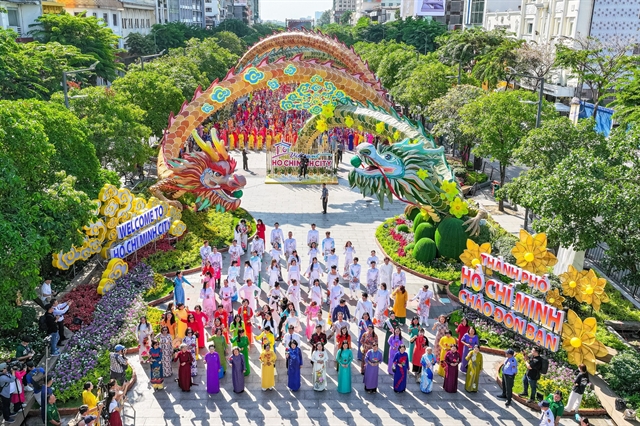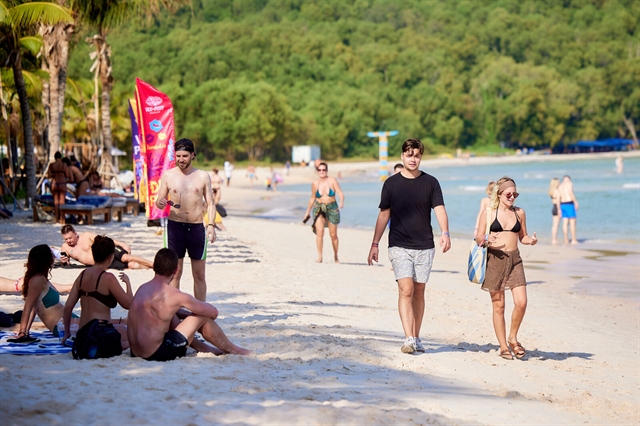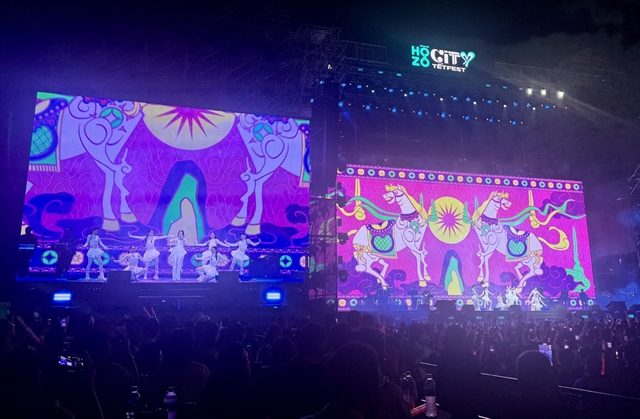 Features
Features

Moved by the plight of children risking lives to get to school, two HCM City youth came up with way to provide practical, sustainable assistance, Bạch Liên reports
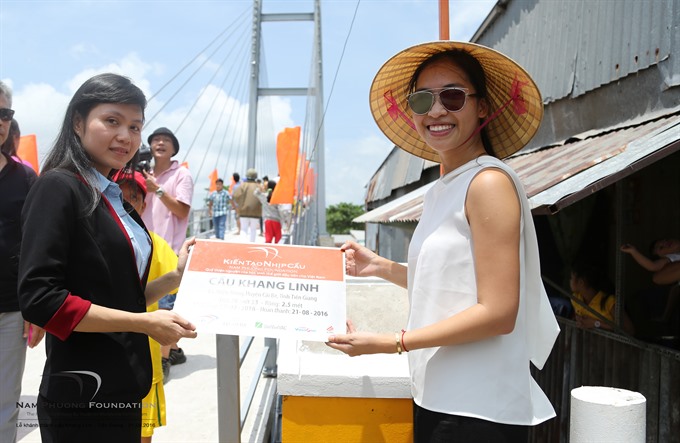 |
| Good job: Nam Phuong, co -founder (right) of the foundation that carries her name, attends the inauguration of the Khang Linh Bridge. — Photo Courtesy of Nam Phương Foundation |
Moved by the plight of children risking lives to get to school, two HCM City youth came up with way to provide practical, sustainable assistance, Bạch Liên reports
A new life began for residents of Thiện Trung Commune last August.
About 2,000 residents, young and old, were all smiles as they watched the inauguration of the Khang Linh Bridge in Cái Bè District, Tiền Giang Province.
The bridge was a dream come true for them.
It meant they no longer had to cross the river on wobbly ferry boats, an everyday danger that became much more risky during the flooding season.
The bridge was constructed at a cost of VNĐ2.7 billion (US$121,500), and residents contributed 40 per cent of the money.
The remaining 60 per cent came from the Build a Bridge project implemented by the Nam Phương Foundation (NPF).
With the inauguration of the new bridge, the foundation has, in the three years since it was established, helped build ten bridges in the Mekong Delta (Tiền Giang, Bến Tre, and Long An provinces).
Build a Bridge rose from the desire of a young woman, Đinh Thị Nam Phương, and her teen brother, Đinh Bá Khang, to help improve the lives of poor communities in the Delta.
Phương, 23, has just graduated from the Philosophy, Politics & Economics Faculty of the Oxford University in the UK, and Khang, 18, is studying economics at the University of California Los Angeles after completing his high school at the International School in HCM City.
Build a Bridge project is the first philanthropic project in Việt Nam that is run entirely by students from different parts of the world who share the goal of bringing out a “permanent, positive change”.
The idea for setting up the foundation was born one evening when Phương and her family were watching a TV report about students who drowned as they tried to cross the river to go to school.
The images haunted Phương and her brother, and they decided to something about it. Encouraged by their parents, they set up a foundation to build bridges to help students and poor communities in the Mekong Delta.
They solicited support and donations from parents, friends and companies. It was not easy. The lack of previous experience was difficult to overcome. The foundation’s activities depended on the efforts of unpaid volunteers who were unable to stay for a long time with the foundation.
But, as more people learnt about the organisation, greater support poured in from volunteer student ambassadors, celebrities, individuals and companies worldwide including Air France, Masan Group Corporation, and the Kinh Đô Company.
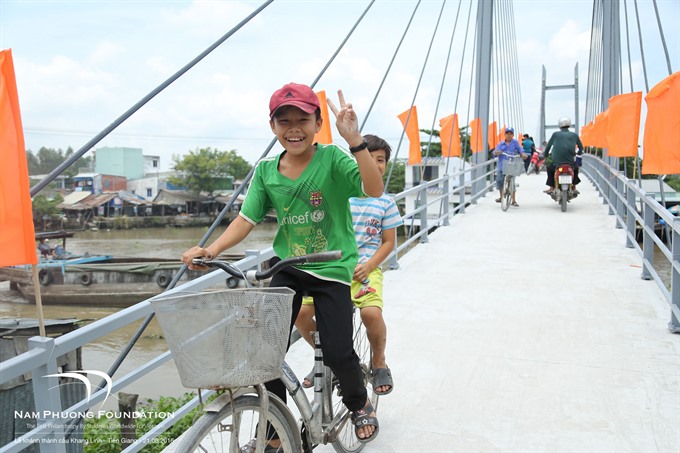 |
| Easy does it: Children smile as they ride bicycles on the newly-inaugurated Khang Linh Bridge in Thiện Trung Commune Cai Be District of Tiền Giang Province. —Photo Courtesy of Nam Phương Foundation |
Hollywood director Phillip Noyce, one of the celebrity ambassadors of the project, said:
“I’m very glad to be part of Nam Phương’s Build-a-Bridge project, and we discussed how I can personally get involved to make a difference. What a gift to the children of Việt Nam! What a gift to all of us to be able to be part of this dream of improving the life of local people!”
Vietnamese singer Phương Vy, Winner of Vietnam Idol Season 1, 2007, one of the celebrity ambassador of the project said:
"I fully support this noble cause, which has been started by a group of very young people. So I want that each of us will do our bit to help build these very necessary bridges for rural, distant areas to help people move around easier, and bring happiness to children who can commute to school daily without dangers or fears.”
More than bridges
The foundation sees the project doing more than just building bridges. Its work offers opportunities for those in need to better their lives.
“Hundreds and thousands of children in rural areas drown each year on their way to school, since the only path often involves crossing rivers via hazardous old boats, flimsy self-built bridges or even swimming, with heavy books and shoes as anchors, unwittingly increasing the danger,” Phương said.
“Building a simple bridge can create an enormous difference for these communities. Not only will young children not be forced to face danger on a daily basis, a bridge will help improve the local socio-economic situation and transform a community,” she added.
Eighty-year-old Trần Văn Luỳnh of Lợi Nhơn Village became emotional as he talked about a new bridge, Ngọc Hoàng, also in Tiền Giang.
“The bridge is very beautiful, the children can go to school and we can move around more easily,” he said.
Lê Ngọc Hân, a 10-year-old student of Tân Tây school in Thạnh Hóa District, Long An Province, said that she enjoyed walking on the new Thủy Tân Bridge. "Before, I used to walk on the bamboo bridge. I was scared because it wasn’t steady.”
Rewarding work
Phương said "doing charity doesn’t just mean giving. It also means receiving a lot and learning a lot from other people."
While working on this project, she said she’d been lucky to meet with several generous people who are not wealthy, but ready to spend their own money and effort building bridges for poor people in Bến Tre Province.
In the future, besides helping build bridges, Phương wants to help poor children who have had to drop out of school because of the dire financial straits their parents are in. VNS
About Nam Phương Foundation and Build a bridge
The Nam Phương Foundation, working with local governments, is dedicated to improving the lives of communities through micro-infrastructure projects that are low cost, high impact, and long term. The foundation aims to reduce water-related dangers facing young children, and improve the socio-economic situation of a community as a whole.
The Build a Bridge project builds bridges to link localities in the Mekong Delta region that are divided by the distributaries of the Mekong River. They work closely with local administrations to assess the needs of each community and discuss how to help locals benefit most from the bridges that are constructed.
The foundation usually contributes 70 per cent of the total expenditure for building a bridge, and the local commune and government is responsible for the remaining costs. This can be contributed in cash or in kind, through labour, transportation, accommodation, meals for construction workers and other activities.

